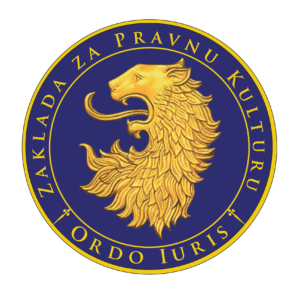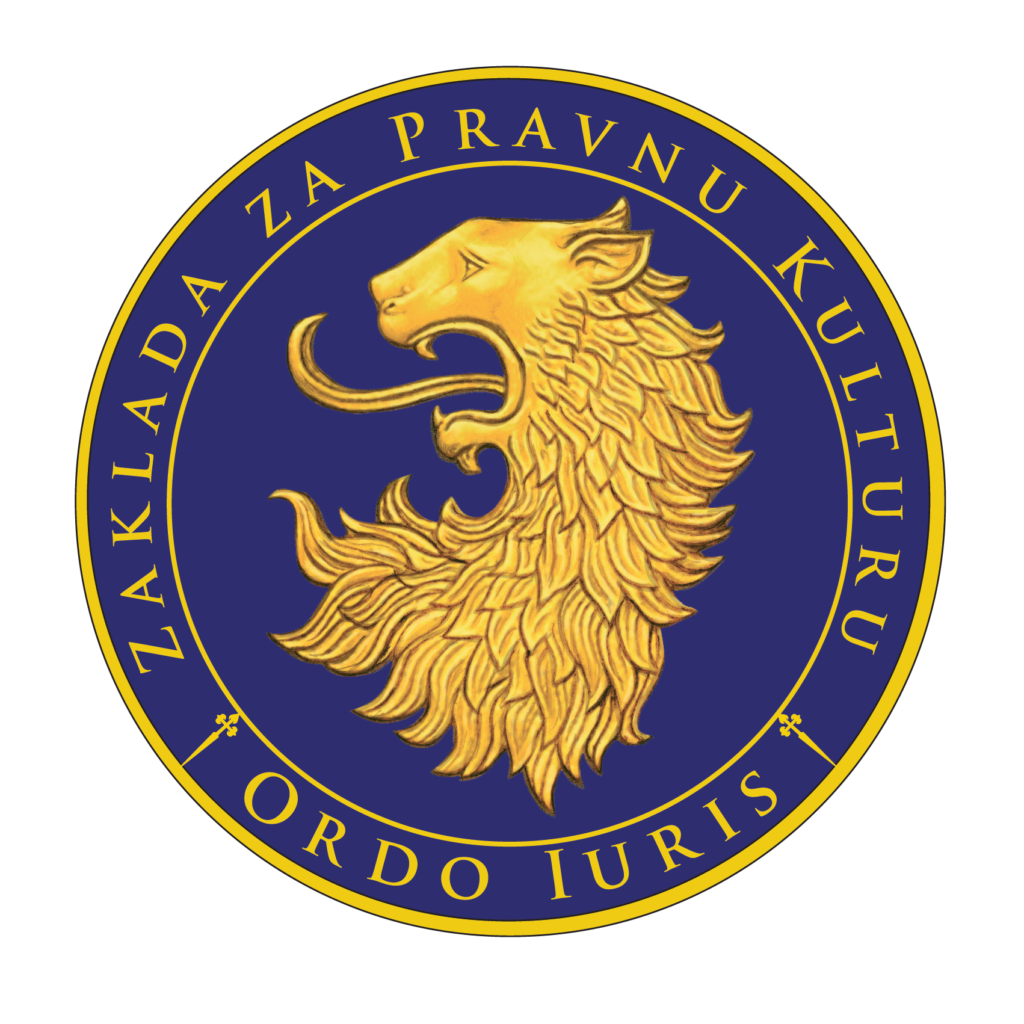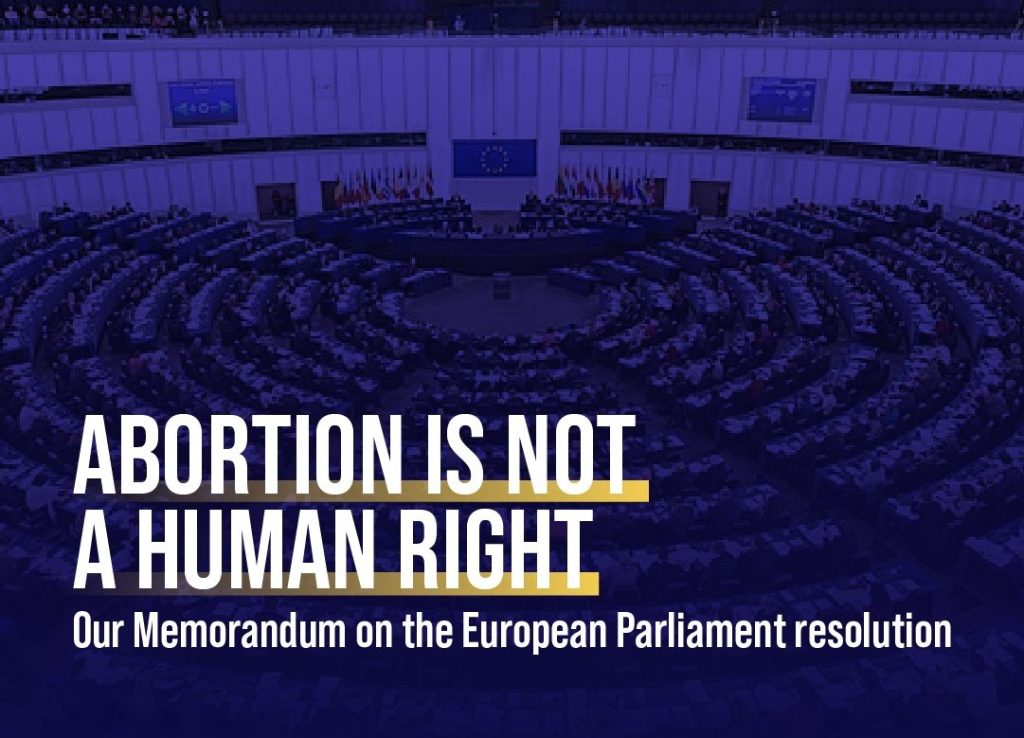Warsaw, 10th April 2024
Memorandum on the European Parliament resolution on including the right to abortion in the EU Fundamental Rights Charter (2024/2655(RSP))
Introduction
This memorandum addresses the potential inclusion of the right to abortion in the Charter of Fundamental Rights of the European Union (EU Charter). After the French Senate sealed the right to abortion in the French Constitution[1], the legislative appetite of France’s conformist president is not waning. Due to the many over-interpretations, attempts to expand the understanding of treaties contrary to their original meaning, and peculiar ideological inclinations regarding the so-called “right to abortion”, the Ordo Iuris Institute would like to present a number of general remarks and emphasize the most controversial issues related to the subject.
- The idea of the “right to the abortion” began to take shape as part of the human rights discourse primarily in the 1990s. Since then, attempts have been made to argue that “sexual and reproductive rights” (including abortion) are an integral part of human rights.
- Abortion as a human right does not appear in any binding international treaty and for the last years numerous states have consequently raised objections to it, pointing out that it is merely an exception to the fundamental right to life. It should be strongly recalled that the final document of the International Conference on Population and Development held in Cairo in 1994 (ICPD) clearly state that abortion may not be promoted as a method of family planning and the states should take actions to limit the number of abortions (point 8.25 ICPD PoA). Moreover, there is also no binding international legal act which would in any way refer not only to „sexual and reproductive rights” but even to sexual and reproductive health and rights. Attempts to portray these non-existent „sexual rights” as allegedly binding international obligations and as an element of human rights are inconsistent with reality and groundless.
- It should be remembered that abortion violates fundamental human rights, especially including the right to live[2] and the right to be free of tortures and inhuman treatment[3]. Abortion is also one of the cruelest forms of discrimination due to sex, color of skin, disability or just the fact of “being unwanted”. It is worth noting that recently several dozen countries (including some belonging to the EU) have directly opposed attempts to perceive abortion as a human right by signing the Geneva Consensus Declaration[4].
- Due to the repeated calls for Member States to provide access to abortion, it should be strongly emphasized that the issue of access to abortion is the exclusive competence of individual states. The European Union has no competence to intervene in the health policies of the Member States. According to Art. 6 and art. 168 of the Treaty on the Functioning of the European Union, the issue of sexual and reproductive health falls within the scope of health policy of states, for which the EU has only supporting competences and cannot seek to harmonize this law in the Member States. It is debatable whether the EU is competent even to speak out or formulate positions on these issues. It should be recalled and strongly emphasized that legal regulations concerning the matters related to killing an unborn child fall within the sole competences of the Member States of the EU, which has been on numerous occasions confirmed by the European Commission[5]. Due to the above, the content of most previous EP resolutions on alleged “right to abortion” seems to be an attempt to put pressure on the Member States and their sovereign prerogatives, which is unacceptable.
- For these reasons, the creation of any form of pressure by the EU institutions on the Member States with regard to the protection of life and abortion should be considered as unauthorized. It is inconsistent with the EU treaty law and the indicated provisions of international law.
- It should also be stressed that the European Court of Human Rights (ECtHR) has never redefined or limited the scope of Article 2. Life at the prenatal stage of development has therefore never been excluded from the protection of the Convention. On the contrary, in a number of its judgments, the ECtHR has indicated that abortion is not a Convention right: there is no right to abortion[6], there is no right to have an abortion[7], and the introduction by a State of a prohibition on abortion does not in itself constitute a violation of the Convention[8].
- The right to conscientious objection is an integral and indispensable element of the freedom of conscience, which is guaranteed both by the constitutional law of the Member States (e.g., the Polish Constitution) and international agreements, in particular the International Covenant on Civil and Political Rights (Article 18) and the Convention for the Protection of Human and Fundamental Rights Freedoms (Art. 9).
- Including abortion in the human rights catalogue undermines the core principles of human rights. The Charter support the already existing rights, such as the right to life (art. 2).
- Therefore, taking everything above into account, the Ordo Iuris Institute recommends to vote against the resolution.
[1] France enshrines abortion as a constitutional right in historic vote, https://www.france24.com/en/europe/20240304-franceto-enshrine-abortion-rights-in-country-s-constitution.
[2] See: Universal Declaration of Human Rights (art. 3), Convention for the Protection of Human Rights and Fundamental Freedoms (art. 2), International Convention of Civil and Political Rights (art. 6).
[3] See: Convention for the Protection of Human Rights and Fundamental Freedoms (art. 3), International Convention of Civil and Political Rights (art. 7).
[4] See: https://documents.un.org/doc/undoc/gen/n20/344/30/pdf/n2034430.pdf?token=WbQnFRb7AEUnVZJhgG&fe=true (access: 09.04.2024).
[5] More: Joint answer given by Mr Andriukaitis on behalf of the Commission, Written questions : E-006285/14, E- 007476, 28 November 2014, https://www.europarl.europa.eu/doceo/document/E-8-2014-006285-ASW_EN.html (access: 09.04.2024).
[6] Silva Monteiro vs Portugal: Decision of the European Court of Human Rights of 26 October 2004, 16471/02.
[7] Jean-Jacques Amycontre la Belgique et enregistrée le 5 août 1985 sous le No de dossier 11684/85. 8 Silva Monteiro vs Portugalii: Decyzja Europejskiego Trybunału Praw Człowieka z dnia 26 października 2004 r., 16471/02
[8] Silva Monteiro vs Portugalii: Decyzja Europejskiego Trybunału Praw Człowieka z dnia 26 października 2004 r., 16471/02


